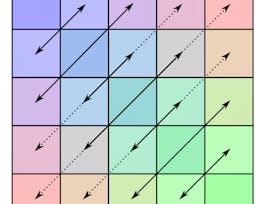This course is devoted to the dynamic implementation of continuous structural elements vs discrete models. The matrix representation and implicit solution of Lagrange’s equation are at the heart of this approach, in the framework of conservative structural systems, with Gaussian modes.



Developments of structural dynamics

Instructor: Yves Gourinat
Sponsored by University of Michigan
1,796 already enrolled
(10 reviews)
Recommended experience
What you'll learn
To implement a matrix approach of dynamics system.
To understand the deep signification of the Lagrange representation.
To be able to make the link between a digital and a continuous dynamic system.
Skills you'll gain
- Engineering Analysis
- Engineering
- Architectural Design
- Building Services Engineering
- Mathematics and Mathematical Modeling
- Vibrations
- Linear Algebra
- Mechanical Engineering
- Architecture and Construction
- Structural Engineering
- Finite Element Methods
- Civil and Architectural Engineering
- Architectural Engineering
- Drafting and Engineering Design
- Mechanics
- Engineering Calculations
- Structural Analysis
- Advanced Mathematics
- Civil Engineering
Details to know

Add to your LinkedIn profile
8 assignments
See how employees at top companies are mastering in-demand skills


Earn a career certificate
Add this credential to your LinkedIn profile, resume, or CV
Share it on social media and in your performance review

There are 5 modules in this course
We will discover the power of Lagrange formalism able to generate the equation of any discrete dynamic system. This seems miraculous because, from energies, we directly extract the complete dynamic equations.
What's included
4 videos2 readings1 assignment1 plugin
Linearity is an important domain. Not only because it corresponds to powerfull mathematic tools but also because it's a nominal way to move for a structure. In this topic, we master the modeling of any digital linear system.
What's included
4 videos2 readings1 assignment
We solve the digital dynamic system by Gaussian diagonalization, thus we discover the concept of natural shapes (or eigenshapes), fundamental for the dynamic behavior of any structure. This opens the world towards resonances and implicit analysis. In fact, the modes represent the actual dynamic DNA of the structure.
What's included
8 videos4 readings2 assignments2 discussion prompts
Real structures are made with continuous beams and shells. Beams are the ideal prototype for the demonstration of continuous modes showing clearly that there is no fundamental difference between discrete and continuous dynamic shapes. We solve the essential problem of bended dynamic beam representing for instance a bridge, a wing, a javelin in flight, etc.
What's included
8 videos4 readings2 assignments1 discussion prompt1 plugin
What's included
1 reading2 assignments
Instructor

Offered by
Why people choose Coursera for their career




Recommended if you're interested in Physical Science and Engineering

Korea Advanced Institute of Science and Technology(KAIST)

Korea Advanced Institute of Science and Technology(KAIST)

Johns Hopkins University

Open new doors with Coursera Plus
Unlimited access to 10,000+ world-class courses, hands-on projects, and job-ready certificate programs - all included in your subscription
Advance your career with an online degree
Earn a degree from world-class universities - 100% online
Join over 3,400 global companies that choose Coursera for Business
Upskill your employees to excel in the digital economy



